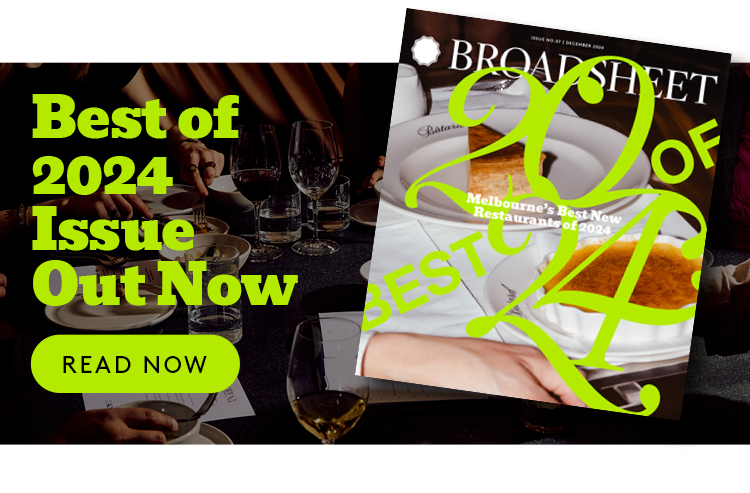Rising Sydney artist Jason Phu won the Art Gallery of New South Wales’s prestigious Sulman Prize in 2015, at 25.
His latest, touring exhibition – my parents met at the fish market – was originally commissioned by Melbourne arts hub West Space. Its new, gallery-wide iteration at ACE Open sees large-scale murals and all-consuming sculptures span five distinct spaces.
Phu is a self-described Chinese/Vietnamese/Australian artist who grew up surrounded by Buddhist, Daoist and traditional Chinese influences. His artwork often portrays the mixed cultural identity of Australians, but this exhibition doesn’t just boil down to that. “There are obvious markers of language ... but it’s not an identity work,” he says.
“Often people see Chinese text and think, ‘This is about being Chinese’. But if they see English they don't think, ‘This is about Shakespeare’, or something else. They don’t make that same connection.
“Chinese and English were my first languages. This is normal for me. But someone else can see it and think it’s about, like, Confucius or some shit.”
Phu’s Chinese mother and Vietnamese father met at a Sydney fish market in the mid-’80s. Pulling from memories and dreams, his works “are about how them meeting is the start of my story,” Phu says. “A lot of it actually comes from their storytelling, too. And I literally mean bedtime stories.”
Walk with bended knees through a gaping, almost-human-height fish mouth. Shimmering silver cloth (with slits for gills) drapes over the exterior; red cloth lines the insides. The supporting structure is a six-person dome tent from Kmart. “I’d love this to be made out of fibreglass to fit the dimensions of the gallery,” Phu remarks as we walk through, “but you gotta be resourceful when you don’t have a massive budget.”
His found-objects aesthetic was borne almost out of necessity. “I didn’t even know what cable ties or a hot-glue gun were two years ago and now they’re a core part of my practice,” says Phu, who regularly sources from Kmart, Bunnings and Sydney party-supply store Base Warehouse.
A wall scrawled tip to toe with Chinese characters lies beyond the fish head. “This is dad texting me his recipe for steamed fish in 88 characters,” says Phu. It’s set behind a bubbling Buddha fountain. “I’m a big fan of Bunnings Buddhas,” he says. “They’re often Thai style, made in China and labelled as Zen Buddhist.”
The next room – titled In my memories – is ruled by a sprawling, reclining Buddha glazed in newspaper. Phu says it captures his parents’ calmness in the face of hardship. “And I’m the demons running around the outside,” he jokes. Projections of a child-aged Phu fishing in Sydney’s Centennial Park and his mum working at the fish market glow on the wall.
In my dreams follows. Push past crinkly blue plastic to uncover a “tacky, prom-like beach scene”. Plates spattered with soy sauce leave an unmistakable scent that’s nostalgic of Phu’s seafood-filled, childhood trips to the beach. A salmon-orange dragon looms overhead.
There’s a strong personal undercurrent, but Phu wants gallery-goers to engage with the exhibition on an individual level. “It’s like I wrote a novel about my life,” says Phu. “It happens to include a lot of my experiences but I hope it’s something people will read and take something away from.”
That journey doesn’t have to be hands-off. “I do want people to walk on the astroturf or sit on a chair and take selfie, but I don’t want to put a sign up [encouraging it].”
What’s next appears like a scene out of television show Dexter, but pitch black. In my nightmares, it’s called. Every inch of the room (including a body-bag-shaped centrepiece) is masked by black plastic. “There’s a romance to the [earlier described] reclining Buddha and the idea of reincarnation,” Phu says. “But we need the darkness just as much as we need the light. This is the nothingness. This is death.”
It’s a plastic-dense exhibition, and Phu – unprompted – acknowledges its environmental impact. “There was a lot of wastage [in the move],” he says. We’re using a lot of plastic. Moving ahead I think the shows will change.”
A fifth, stark-white installation in the foyer reacts against the darkness. “The main concept is love as purgatory, the in-between,” Phu explains. Gods riding animals is a common motif. Here, they ride blow-up swans. “It’s a bit of a piss-take,” he says, grinning. “The four words [one on each god] are eat, pray, love ... and death.”
In a 2015 interview with Broadsheet following his Sulman Prize win, Phu said, “I still have a long way to go.”
He considers it three years later, ahead of an appearance in the MCA’s Primavera 2018: Young Australian Artists next month: “When I say [that] I mean I’ll be satisfied if I’m still practising at 60 ... having reacted and changed every year until then.”
“I’m aware it’s all about longevity because the arts is a completely unsustainable career – with how our funding works. But the more successful I am the more out-of-pocket I am.”
my parents met at the fish market runs from Thursday October 4 to Saturday November 17 at ACE Open.










